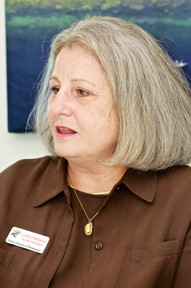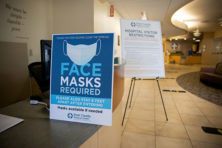Door County Schools Asking Voters for Support this April
- Share
- Tweet
- Pin
- Share
This April, voters in the Sevastopol, Washington Island, Sturgeon Bay, and Southern Door school districts will likely face a familiar choice, as those districts are all looking at placing revenue limit override referendums on the ballot.
Sevastopol is currently in the second year of a two-year override referendum that was passed in April 2011. That referendum allowed the district to exceed the property tax cap put in place by the by the state’s school funding formula by $900,000 this school year.

Sevastopol’s Linda Underwood is just one of four school district superintendents who will be asking their communities to approve a revenue limit override referendum this April.
Superintendent Linda Underwood said the school board will ask voters to pass a three-year referendum this April, with the amount starting at $1.15 million for the ’13-14 school year before increasing to $1.35 million and $1.75 million respectively in each of the following two years.
“We ran this every which way,” said Underwood. “There are a few items in the next budget years that are not in this budget year.”
Those new items include school bus purchases that will take place in both the ’13-14 and ’15-16 school year and technology infrastructure upgrades. Underwood said those new items, along with increases in salaries, health insurance, fuel, and other fixed costs, drove the referendum amount up, but the school has done it’s best to find other places to move money from.
“Reductions have been made where we can make them, but the problem is increasing costs,” said Underwood.
Underwood said the school plans to utilize some of its $3,030,130 fund balance to supplement the referendum money, and she’s unsure what kind of funding will come out of the state’s next biennium budget.
“Some of the things the state has done to plug some of the holes go away after a year, so you never know,” said Underwood. “So you go through all these figures and figure out what less revenue you’re going to have. Hopefully, someday we’ll be able to see what more revenue we’re getting, but we’re not there yet.”
Washington Island Superintendent Tim Raymond said his school will be trying something new this year, moving from a one-year to a two-year override referendum.
“Going to referendum every year is tough on our community,” said Raymond. “From December through April a good chunk of my time is focused on the referendum; the teachers are focused on the referendum. This gives our school district the opportunity to just be a school for a year.”
The two-year referendum would ask for a $391,000 override in the ‘13-14 school year and a $481,000 override the next year.
Raymond said the school’s overall budget is going to be held steady at the $1.26 million mark it was at this year, and the increase in the override amount from one year to the next reflects a projected drop in state aid due to declining enrollment.
“There’s a commitment by this school district to remain within our means, and taxes will remain consistent,” said Raymond, who was also hopeful that the district’s new expeditionary learning programs would bring in more new students.
According to Southern Door Superintendent Patti Vickman, Southern Door Schools hadn’t decided on an exact referendum amount before press time, but the school board would be taking up the matter at a special meeting on Jan. 16.
The Sturgeon Bay school board had also not reached an official decision about whether or not to go to referendum before press time, but Administrator Joe Stutting said the school was looking at a ‘13-14 budget shortfall of $1.5 million before health care cost reductions, sub-contracting the district’s bus routes, and other money-saving measures brought the amount down to $1 million.
Stutting said costs will likely increase $300,000 each year after that, so the district is considering a three-year override which starts at $1 million in ’13-14 and increases by $300,000 each year.
If Sturgeon Bay decides to put a referendum on the ballot it will be the district’s third. Stutting said referendums will probably continue as long as the state’s school revenue limit formula, which heavily burdens land-rich and pupil-sparse schools like those in Door County, remains in place.
“The revenue limit was designed to lower property taxes, but it was never designed to run a quality school,” said Stutting. “It was supposed to be temporary, but we never ended it. So districts in Door County have been cutting and cutting and cutting until finally we were no longer just trimming fat.”
Underwood said the state Superintendent of Public Instruction, Tony Evers, has put out a plan to reform how the state funds public schools, but no one has really pushed to get it to the floor in the legislature.
“Anything in there would help us a lot,” said Underwood.
Stutting said Evers’ plan, called “Fair Funding for Our Future,” would require money to implement and that’s probably the biggest problem in getting it fast-tracked.
“The biggest part of the state budget is education, and a fix requires even more dollars,” said Stutting. “No elected official wants to raise taxes anyways as it’ll get them unelected. We’re still in tough times.”
In these tough times, said Stutting, the school recognizes that it should only ask taxpayers for what’s necessary to provide a quality education for their children.
“Over the last three years, we never taxed to the full authority [given with the referendum],” said Stutting. “It’s easy for me to say to our taxpayers that if we don’t need the money, we’re not going to tax you for it.”
As the election approaches, Stutting, Raymond, Vickman, and Underwood said their schools will be distributing more information about their referendums, and voters are encouraged to contact the schools if they have any more questions.
“If anyone has any questions, have them give me a call,” said Underwood. “That’s my job, is to answer these kinds of questions.”

